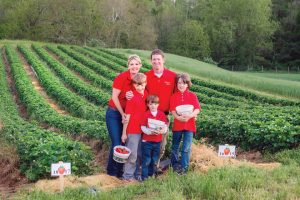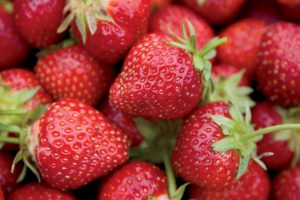Home > Virginia > Virginia Farm to Table > Small Farms Make a Big Impact on Virginia Agriculture
Small Farms Make a Big Impact on Virginia Agriculture
In partnership with: Virginia Department of Agriculture and Consumer Services
There’s nothing quite like biting into a freshly picked strawberry or sampling a new, exotic vegetable at the family dinner table. Across the Commonwealth, small-scale farmers are making these delicious experiences possible for consumers.

Wegmeyer Farms
Tyler Wegmeyer was exposed to agriculture at a young age, growing up on a dairy farm. He even grew his own small patch of pumpkins. But as an adult in 2002, and now married to his wife, Harriet, Wegmeyer got a surprise when he went to buy pumpkins one fall.
“We spent $40 on two and I thought, ‘Wow, that’s really expensive,’” he says. “So, we decided to start growing our own and began selling directly at farmers markets.” After being asked repeatedly at the farmers markets about U-pick pumpkins, Wegmeyer began to think about expanding the scope of his small pumpkin farm. He recalled fond memories of picking strawberries with his mother in Michigan as a child.
“I remember thinking that when I grew up, I wanted to be a strawberry farmer,” he says. “I saw the opportunity when Harriet and I started going to the farmers markets with the pumpkins.”
See more: Virginia’s Top Agricultural Commodities

Now, Wegmeyer Farms is about 250 acres, with 8 acres of raised-bed plasticulture strawberries and 85 acres of pumpkins in Hamilton. The small family farm consists of Tyler, Harriet and their three boys who help out. The family sells to farmers markets and offers U-pick seasonal activities, as well as selling the pumpkins wholesale. Wegmeyer says he enjoys being a small farm with big dreams.
“I don’t have the ability to farm thousands of acres where I am geographically,” he says. “I use the philosophy of working small with a big-scale mentality so I can be as efficient and profitable as possible.”
Wegmeyer Farms also formed a partnership with its neighbors to put together a fall agritourism destination.
“It feels really good to get that many people out of the city and on a farm,” Wegmeyer says. “To be able to share that is gratifying, and we try to emphasize education and teach people a bit about agriculture while they’re here.”

A Taste of Africa

Michael Carter is also on a mission to teach consumers. Though in his case, some people have never even heard of the crops he grows. Carter farms on land in Unionville that has been in his family for the past 110 years. Love for Africa’s agricultural legacy led him to begin planting produce native to the continent.
“My part of the operation is very small, less than 2 acres,” he says. “We currently grow between 12 to 15 crops, including cocoyam/taro root, cassava for the leaves, garden egg, Nigerian spinach, jute leaf, turmeric, various hot peppers, banana plants, callaloo, okra, managu, spider plant, peanuts, hibiscus, soursop, moringa, sweet potatoes and a few pigeon pea plants. Most of these are used in traditional African and Caribbean dishes from around the continent.”
See more: Virginia Farms Come in All Sizes
To showcase the ethnic flavors, Carter incorporates afritourism into his farm, sharing the contributions of agriculture by those of African descent.
“We offer limited, by-appointment tours of our African crops, sharing the story of our family and the land,” he says. “In 2021, we’ll also offer virtual tours and more interactive programming.
I want to encourage more, if not all, Black people to purchase land. And if people already have land in their families, to research their stories and encourage youth to return to the land.”
Michael Carter, farmer, Carter Farms
In addition to farming, Carter runs a nonprofit called Africulture, which offers workshops, training, classes and conversations on African contributions to agriculture, diversity, racial immersion and more.
“Afritourism is important because the Commonwealth has seen a 65% decline in the number of Black farmers in the last 40 years and a 95% decline since 1935 in the state,” Carter says. “I want to encourage more, if not all, Black people to purchase land. And if people already have land in their families, to research their stories and encourage youth to return to the land.”
Support Local
Similar to Wegmeyer, Carter says that the best way for consumers to support small, local farms is by spending their money with them.
“It’s so important to support our farmers because we are the backbone, or better yet, the stomach-fillers of the state,” he says.




How to find is my nearest local farm ?